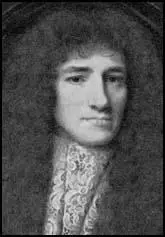Anthony Ashley Cooper, 1st Earl of Shaftesbury

Anthony Cooper was born in 1621. The son of a large landowner, Cooper was educated at Oxford University and Lincoln's Inn.
In 1640 Cooper was elected to the House of Commons. On the outbreak of the Civil War Cooper initially supported Charles I but changed sides and accused the king of following policies "destructive to religion and State".
Cooper kept in the background until being appointed as a member of a law reform commission in 1652. Later he joined the Council of State. However, in 1655, he resigned in protest against the dictatorial methods of Oliver Cromwell.
In 1659 General George Monck recruited Cooper in his campaign to restore the monarchy. After the Restoration he was rewarded by being appointed Chancellor of the Exchequer. Cooper was also a member of the commission that tried the Regicides.
Cooper was a strong supporter of religious toleration and this resulted in him clashing with Earl of Clarendon. Cooper survived but Charles II was wary of his religious views and did not inform him of the Treaty of Dover where the king promised to become a Roman Catholic in return for French subsidies.
Cooper continued to support the king's policies and he was created Earl of Shaftesbury and made Lord Chancellor. However, he was later dismissed from office when he expressed doubts about the role being played by the king's brother, James.
Earl of Shaftesbury now argued that Charles II should call a new Parliament to discuss these issues. His supporters began to wear green ribbons (the colours of the Levellers). The king, concerned about this act of rebellion, had Shaftesbury arrested and sent to the Tower of London.
Dissatisfaction with the king continued and after a year Shaftesbury was released and James was sent to live abroad. Shaftesbury was brought back to power as president of the privy Council. In this position he urged Charles II to remarry in an effort to produce an heir to the throne. Charles, who wanted his brother to succeed him as king, refused, and dismissed Shaftesbury from office.
In July 1681 Shaftesbury was arrested and charged with high treason. However, in November, 1681, the grand jury threw the charges out. Shaftesbury was released but fearing he would be arrested again, he fled to the Netherlands where he died in 1683.
Primary Sources
(1) Edmund Ludlow, Memoirs of Edward Ludlow (c. 1680)
Sir Anthony Ashley Cooper, also a great instrument in this horrid treachery, as he was most active amongst those of the Parliament who were consulting for their restitution, so notwithstanding the affronts he had formerly put upon me, the Lord Arundel being pressed by the trustees and contractors at Drury House for the paying in of thousands of pounds which he was in arrears for some lands which they had sold of his to some of his friends, and which Cromwell had discharged him of, they not allowing that to be a sufficient discharge threaten him to sell the land again, according to a command they had received from the Parliament to that purpose, if he forthwith paid not the said arrears. It being apprehended that my letter to them might be of service to him therein, he the same Sir Anthony, coming to me with him to desire me to write on his behalf, professed to be very affectionate to the interest of the Commonwealth, which he did so to the life that I was much pleased therewith, having always believed him to be otherwise inclined. But notwithstanding his fair words, I was not so confident of him as to repose any great trust in him, he having played fast and loose so often, declaring sometimes for the king, then for the Parliament, then for Cromwell, afterwards against him, and now for the Commonwealth.
About this time I went to Sir Arthur Haslerig, whom I knew to be of a most rigid and inflexible spirit, and endeavoured as well as I could to persuade him of the necessity incumbent on us all to lay aside our private animosities, and to unite our whole strength to preserve the vessel of the Commonwealth from sinking. I desired him to entertain a better opinion of Sir Henry Vane, and some other persons than he seemed to have, assuring him that it was impossible to prevent that ruin which threatened us.
